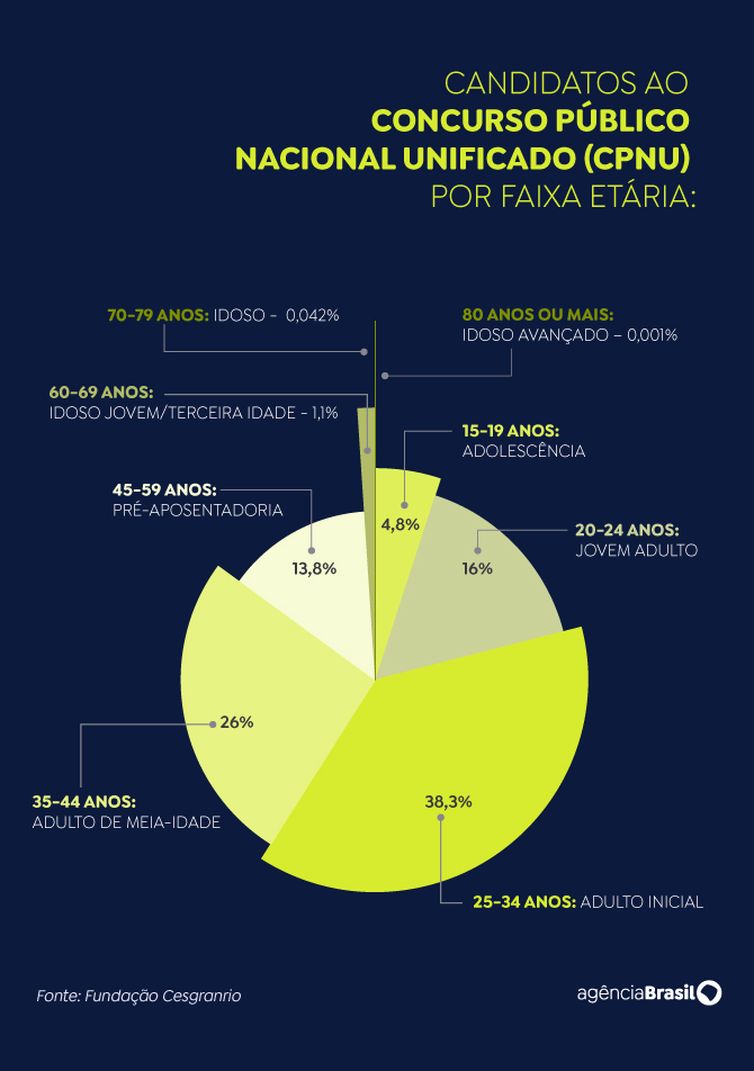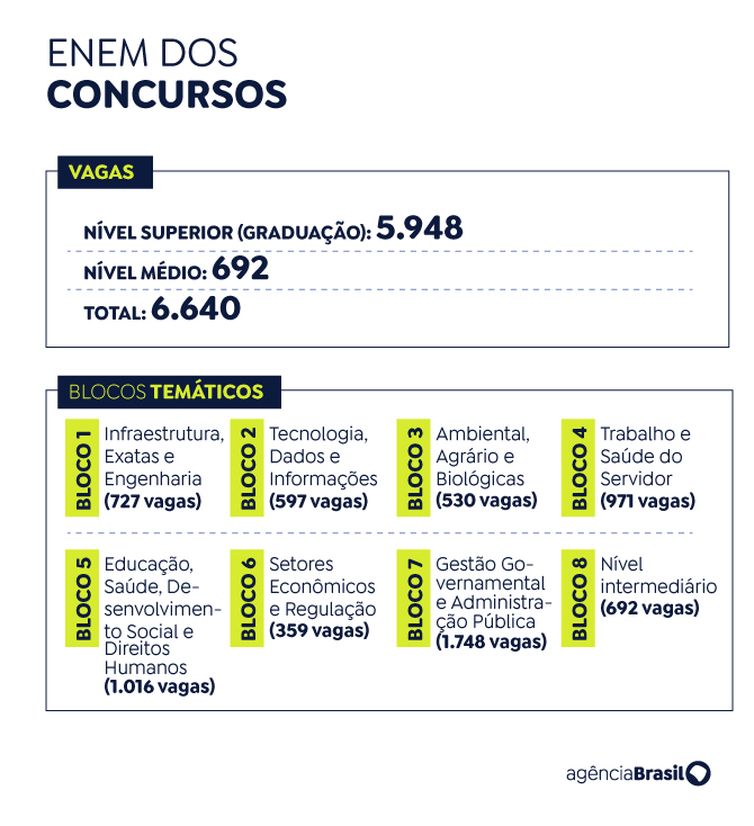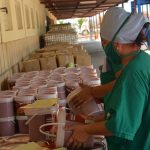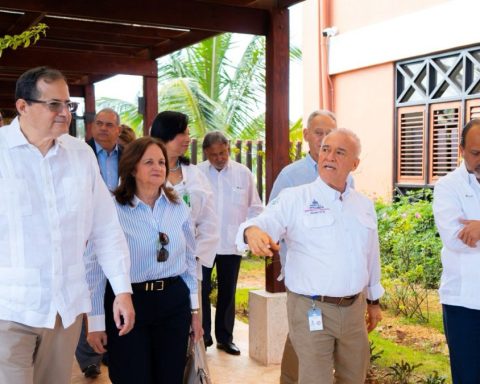Candidates in the Unified National Public Competition (CPNU) aged between 20 and 44 represent 80.3% of the total applicants, more than double the age range in the composition of the Brazilian population, which corresponds to 38.72%, according to the 2022 Demographic Census, by the Brazilian Institute of Geography and Statistics (IBGE).

Among this age group, adults aged 25 to 34 were those who showed the greatest interest in joining the federal workforce.
Data on the distribution of applicants by age group comes from the Ministry of Management and Innovation in Public Services.
This Sunday (18), more than 2.11 million registered students, including paying and exempt students, will take the exams, in two shifts, after being postponed in May, due to the calamity situation experienced by Rio Grande do Sul caused by the heavy rains that fell in the state between April and May.
Age groups
According to the company organizing the so-called Enem dos Concursos, Fundação Cesgranrio, the largest group of candidates in this age group of young people and adults is 25 to 34 years old, with 821,523 confirmed registrations (38.3% of the total number of candidates).
In the group between 25 and 34 years old, women are the majority, with 56.3% of registrations. Men account for 43.7% of the total. In absolute numbers, there are 462,377 women and 359,146 registered between 25 and 34 years old.
The second largest group of applicants are between 35 and 44 years old: 556,948 candidates or 26% of the total, a percentage that also exceeds the age pyramid of the 2022 Census, as the population aged 35 to 44 corresponds to 15.87% of Brazilians.
In third place is the group of candidates between 20 and 24 years old: 342,988 candidates (16% of the total). Next come those registered between 45 and 59 years old, who are 13.8% of the total, with almost 300 thousand (296,359) candidates.
The fifth group is made up of teenagers aged 15 and 19 (4.8% – 342,988 registrations).
And there are also senior citizens interested in passing this Sunday’s test and securing a position in the federal civil service, since the positions do not impose a maximum age limit. Almost 23 thousand (22,826) people aged between 60 and 69 years old registered for the competition and represent 1.1% of the candidates.
Candidates aged between 70 and 79 represent 0.042% of the total. Finally, 0.001% of the total are elderly candidates aged 80 or over who will compete in the competition.
In the event of a tie in the classification, one of the criteria adopted to break the tie is age. Preference is given to candidates who are 60 years of age or older, up until the last day of registration.
The Cesgranrio Foundation also disclosed the interest of applicants by age group in the eight thematic blocks of the competition, defined by areas of training.
The competition for places will be fiercer in thematic blocks 8 (intermediate or medium level) and 7, Government Management and Public Administration block, in which the majority of places are reserved for candidates with a degree in any area of knowledge.
Among those aged 20 to 24, the largest number of applications were for thematic block 8; with 188,501 candidates, or 55% of the total number of applicants in this age group. In the same age group, the second largest number of applications were for block 7.
In the 25-34 age group, the majority of candidates (26.8%) will compete for places in thematic block 8 (intermediate level). In second place, 21.6% of the young candidates in this group are trying for a place in the Government Management and Public Administration block, number 7.
Among candidates aged between 35 and 44, the preferences are reversed. Candidates in group 7 (Government Management and Public Administration) are the majority in this age group, with 132,162 applicants (23.7% of applications). In second place is the public that opted for group 8 (Intermediate Level): 122,815 applicants, representing 22.1% of the total in this age group.
Profile
Among the 2.11 million candidates registered in the Unified National Public Examination, 1,118,404 (or 56.2%) declared themselves to be female and another 925,741 candidates (or 43.8%) were male. However, the MGI emphasizes that the declaration of gender was not mandatory at the time of registration and, therefore, not all candidates filled out this field of the questionnaire.
https://agenciabrasil.ebc.com.br/geral/noticia/2024-08/mulheres-sao-maioria-de-inscritos-no-concurso-unificado
Among the candidates for the 6,640 vacancies in the competition for 21 federal public administration bodies, 415,496 candidates declared themselves to be black (brown and black); 43,926 declared themselves to be people with disabilities (PCD) and another 10,394 candidates declared themselves to be indigenous.
Racial quotas have been guaranteed in Brazil’s public service since 2014 by law no. 12,990, which reserves 20% of the vacancies offered in public competitions for black people.
And since December 2023, Decree No. 11,839/2023 allocates 30% of vacancies to candidates from indigenous peoples, in areas of the National Foundation for Indigenous Peoples (Funai). The unified competition also includes vacancies for the Ministry of Indigenous Peoples (MPI).
Regarding average income, the MGI report also shows that of the total number of confirmed applicants, 56.4% have an income of up to three minimum wages (R$4,236), or 1.14 million participants. At the other end, with higher incomes, 6.3% of candidates already earn more than ten minimum wages (R$14,120) or 124.8 thousand applicants.
Enem of the Competitions
The Unified National Public Competition will apply, this Sunday (18), simultaneously, tests in 228 cities, including capitals and municipalities of all units of the federation, to fill effective public positions in federal public bodies.
The Federal District is the federation unit with the largest number of applicants for the competition: 195.6 thousand candidates, surpassing the rates of more populous cities such as Rio de Janeiro (125,520) and São Paulo (86,895).
The more than 2.11 million confirmed candidates will compete for 6,640 vacancies for permanent public positions, in the largest public competition in the history of Brazil and in an unprecedented format and single application of the tests, with the objective of promoting equal opportunities for interested parties.
The event will have reinforced security in an enforcement network integrated by several public agencies, created by the MGI. The Federal Police, the Federal Highway Police (PRF), the Brazilian Intelligence Agency (Abin) and the National Public Security Force will provide support in the logistics and security of the event.




















